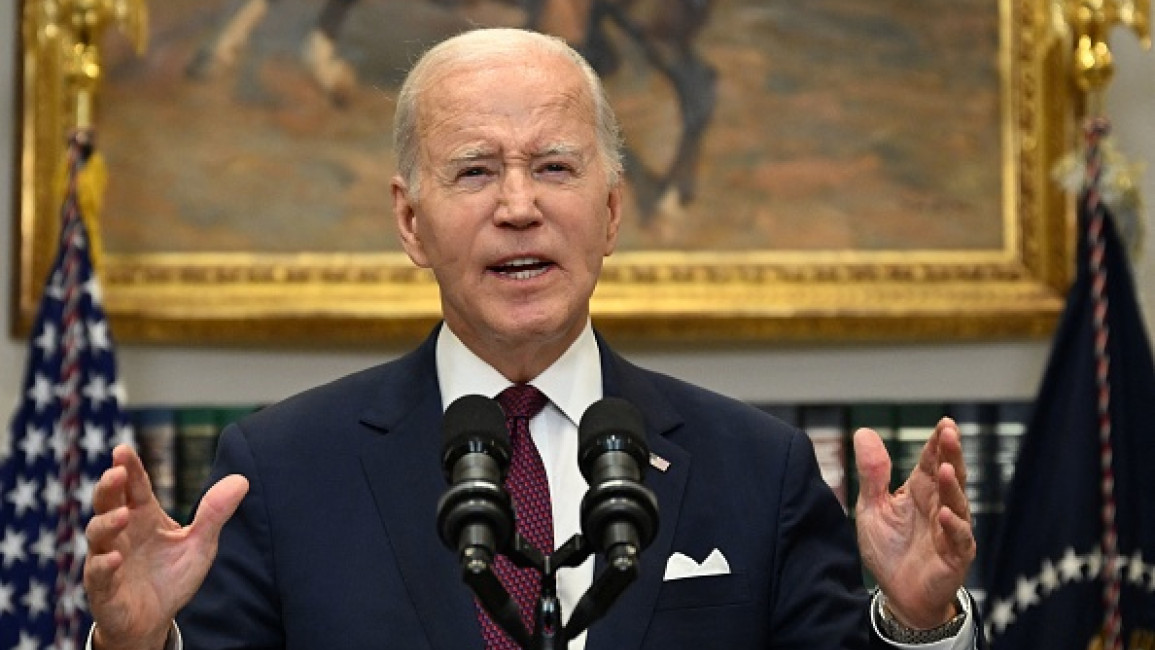'It's an attack on Black people': Uproar as Supreme Court strikes down affirmative action in colleges
Lawmakers, academics, activists and ex-presidents and others slammed an unprecedented ruling from the Supreme Court of the United States (SCOTUS) on Thursday to strike down affirmative action in college admissions.
US President Joe Biden, in a special address at the White House, stated starkly that the court's decision has "effectively ended affirmative action in college admissions".
He said he "strongly, strongly disagreed" with the ruling and then expounded the benefits of diversity in education.
However, perhaps a more visceral assessment of the ruling from Biden came as the president was leaving the press conference. A reporter shouted a question about whether he was dealing with a "rogue court".
"This is not a normal court," was the president's response.
Vice-President Kamala Harris said in a statement that the ruling was "a step backwards for our nation".
President Biden: “This is not a normal court.” (Video: C-SPAN) pic.twitter.com/jZTdHGjRph
— Mike Sington (@MikeSington) June 29, 2023
Biden and Harris’ sentiments were shared by other leading figures of the Democratic establishment, including Barack and Michelle Obama.
The former president released a short statement, saying: "Like any policy, affirmative action wasn't perfect … But it allowed generations of students like Michelle and me to prove we belonged … Now it's up to all of us to give young people the opportunities they deserve."
In a more heartfelt response, the former first lady wrote about her experiences as one of the few Black students on campus during her time at Princeton and Harvard and how she used to wonder if white students thought she had benefitted from affirmative action.
She said in a statement: "Today, my heart breaks for any young person out there who's wondering what their future holds — and what kinds of chances will be open to them."
"Today is a reminder that we've got to do the work not just to enact policies that reflect our values of equity and fairness, but to truly make those values real in all of our schools, workplaces, and neighborhood."
Left of centre progressive Democrat member of Congress Alexandria Ocasio-Cortez questioned the hypocrisy of SCOTUS in ruling against race-conscious affirmative action, while allowing "legacy admissions", which she called "affirmative action for the privileged".
"Seventy percent of Harvard’s legacy admissions are white, SCOTUS didn't touch that," she added.
If SCOTUS was serious about their ludicrous “colorblindness” claims, they would have abolished legacy admissions, aka affirmative action for the privileged.
— Alexandria Ocasio-Cortez (@AOC) June 29, 2023
70% of Harvard’s legacy applicants are white. SCOTUS didn’t touch that - which would have impacted them and their patrons.
Trump-influenced conservative super-majority
The court ruled, in a six to three opinion written by conservative Chief Justice John Roberts, that Harvard University and the University of North Carolina's admissions programs violate the equal protection clause of the 14th Amendment.
The ruling means that universities can no longer apply polices that allows for the proportional representation of historically discriminated against and underrepresented groups, namely Black, Latino and Native American students.
The policy was introduced in the 1960s in the context of the repealing of formal white supremacy, known as the Jim Crow laws, in order to enhance racial diversity in universities.
The case was brought to the SCOTUS by conservative activist Edward Blum, who has spent decades litigating against affirmative action, which he claims discriminates against white people and, more recently, Asian Americans.
The six justices that ruled to strike affirmative action down are part of SCOTUS’ conservative super-majority, three of which were appointed by former president Donald Trump, who called the ruling "a great day for America".
'No one is fooled'
Roberts, in the majority opinion, wrote that race can be taken into account by universities, but only if it is "concretely tied" to a "quality of character or unique ability", concluding that "the student must be treated based on his or her experiences as an individual—not on the basis of race".
However, the three liberal dissenting judges said the ruling makes it practically impossible for colleges and universities to practice race-conscious admission policies.
Justice Sonia Sotomayor in reaction wrote that the court was "imposing its preferred college application format" on the country by "taking on the role of college administrators to decide what is better for society".
"Because the court cannot escape the inevitable truth that race matters in students’ lives, it announces a false promise to save face and appear attuned to reality," she wrote. "No one is fooled,"
What a sad day! This is another attack on Black people! Let us prepare for a more intense fightback! Here is my statement on Affirmative Action on my sister Dana Bash’s CNN show! #AffirmativeAction pic.twitter.com/AqwbZ3r4VW
— Cornel West (@CornelWest) June 29, 2023
Cornel West, the former Harvard student, professor and current Green Party presidential candidate, reacted to the ruling in a sombre appearance on CNN, saying "it's a very sad day" and that the Supreme Court’s decision was "absolutely wrong".
"Let us be clear, and let us not be deceived, it's an attack on Black people," West added.
On the Supreme Court’s ruling that the US must be "indifferent to race", West pointed out that SCOUTS had upheld "slavery for 100 years and then Jim Crow for another 100 years". West said that the issue underlying the ruling lies in the question of "how do you come to terms with the humanity of black people in a nation shaped by white supremacy?"



